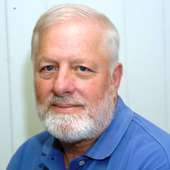Love for America knows no borders
Saturday, January 20, 2018
Ralph Higgerson, a local barber, knew Henry "Heini" Buchert.
Heini was born in Austria, in 1883, grew up in Krakraw (sic), Austria, and came to this country from Hamburg, Germany, in 1902 when only age 19. He first settled in Cincinatti, Ohio, and in 1908 moved to New Madrid. Ralph recalled that Heini's English had a distinctive German accent and sometimes his syntax would insert a word at an unusual place in his sentences. Ralph noted that the more Heini drank, the thicker his German version of English would become.
Heini's obituary in 1955 noted that he was "well known over the area as a fine tailor . . . . For many years he operated a men's clothing store and cleaning and pressing establishment in New Madrid." A 1940s Main Street photo shows his "Men's & Boy's Furnishings" shop located on the west side of the 300 block.
Ralph and Heini frequented the same local bar on Main Street on Saturday evenings after Ralph had closed his barber shop. Heini would be ahead when Ralph arrived for his evening beer.
"Heini always talked about how hard life was in Europe. One time he commented on all the grain being spilled along the highway during our harvest season. 'In Germany,' he said, 'people would be out sweeping it up and taking it home to eat. Here, you just leave it.'"
Ralph continued, "He would always tell some story and then end it with a speech about how wonderful America was. When he got to the part when he was God blessing the United States, the whole bar could hear him. With each praise of our country, his voice would rise.
"Finally, Heini would take a handkerchief out of his pocket, get down on his knees, spread the handkerchief on the barroom floor, and say 'I kiss the very ground I walk on in this country' and plant a kiss on the handkerchief.
"This was Heini's usual routine on Saturday evening," concluded Ralph.
Although retired by 1955, Heini still did tailoring work and was returning from Portageville from that work when he died as a result of an automobile wreck on U. S. 61 near Lilbourn. He was survived only by his wife, Margie Michalke.
Another European immigrant who lived in New Madrid wasn't as successful or vocal as Heini. Her name was Anna Haase, known locally as "Dutch Annie."
Annie was born in Germany on March 1, 1875.
She arrived in New Madrid in the 1920s. One source indicates she and her husband were with a traveling show. The show passed through New Madrid. Annie liked New Madrid but her husband didn't. He left with the show. She remained in New Madrid.
Annie wandered the business district in the early mornings gathering up anything of use. One resident remembered her as a mysterious figure he saw roaming around town. Her dress was European, a long coat that went to her ankles and a brimless hat that covered her head, the back extending down the nape of her neck and over her ears. She regularly attended the local Catholic Church where I recall seeing her at morning Mass.
She was poor and kept to herself, living in a small house nestled up against the levee on the east side of town. In February 1964, when nearly 88 years of age, neighbors discovered her body upon entering her home when she did not answer her door. Sam L. Hunter Jr. paid for her burial in Evergreen Cemetery.
Not much else is known about her. She reminds me of Eleanor Rigby of the Beatles song by the same name:
All the lonely people
Where do they all come from?
All the lonely people
Where do they all belong?


